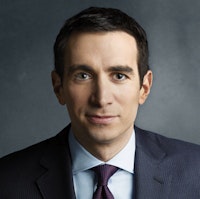
Show Notes
Where will artificial intelligence be in five years, or 10 or 20? What happens if the technology is regulated? And if it isn’t? How will it shape the world and the way we live our lives? The CEO of Microsoft AI, Mustafa Suleyman, has been working in this young field for more than a decade. He knows the AI landscape inside and out, and is a level-headed advocate for the technology’s future. He talks with journalist Andrew Ross Sorkin, the co-anchor of CNBC’s “Squawk Box,” about how to proceed carefully and bring out the best version of AI while fostering progress. He believes friction and regulation aren’t necessarily a bad thing for an industry that could literally change the way we think about ourselves as humans. Suleyman is the bestselling author of “The Coming Wave: Technology, Power and the 21st Century’s Greatest Dilemma.” Their conversation took place at the 2024 Aspen Ideas Festival.
Explore
Related episodes


Whether they publicly tout it or not, U.S. technology companies play a powerful role in politics, cultural issues and the way we live. Founder and investor Peter Thiel is one of the more visible and outspoken Silicon Valley figures. A member of the so-called "PayPal Mafia," a highly successful group of PayPal founders and employees, Thiel waded into the limelight in the le...


Sizable electorates around the world are flocking to populist candidates who promise power, domination and a return to better times. The global experiment in liberalism seems to be suffering a setback. In his latest book, “Age of Revolution,” journalist Fareed Zakaria teases apart the foreign policy decisions that got us to this point. Several U.S. missteps, such as the wa...


Conflict and suffering can bring out the worst in people, but it can also bring out the best. This is one of the lessons New York Times columnist Nicholas Kristof has learned from decades of reporting on the ground in war zones and amidst humanitarian nightmares. Somehow, despite witnessing atrocities like the Tiananmen Square protests, genocide in Darfur and war in Iraq,...


It doesn’t look like we’re going to be able to put the generative artificial intelligence genie back in the bottle. But we might still be able to prevent some potential damage. Tools like Bard and ChatGPT are already being used in the workplace, educational settings, health care, scientific research, and all over social media. What kind of guardrails do we need to prevent...


Artificial intelligence is making world-changing advances every day. But these powerful tools can be used for malicious and nefarious purposes just as easily as they can be used for good. How can society put guardrails on this technology to ensure that we build the most safe and responsible version of the future, where A.I. is assistive rather than weaponized? Google’s sen...








